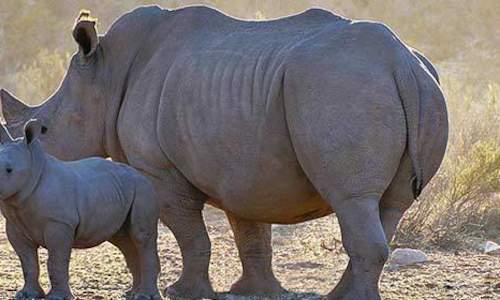
The Gauteng Environmental Management Inspectors (EMIs), better known as the "Green Scorpions" successfully tracked down and arrested rhino horn smugglers at the customs section of OR Tambo International Airport on Tuesday July 10, 2007, reports Bongani Mlangeni of Bua News.
Thabo Ndlovu, chief director responsible for compliance and enforcement in the Gauteng department of agriculture, environment and conservation, said customs officials at the airport detected four rhino horns hidden inside a suitcase which was destined to be exported to China and Vietnam.
Thabo said the horns were wrapped in newspaper and sealed with tape, weighing an estimated 25 to 30kg. The exact weight will only be determined after it has been submitted to the SAPS forensic unit.
"After further investigation, the EMI located and apprehended two suspects in connection with the illegal export of these horns," he said. The suspects are Vietnamese citizens, one of whom was arrested and is currently in custody awaiting a court appearance.
The second suspect was interviewed and released. The passports of both men have been seized pending further investigation. On Tuesday, more than 100 Green Scorpions descended on various international border posts across the country to monitor incoming and outgoing products. Inspectors joined their counterparts in Sars customs and the Saps border police.
The Green Scorpions were present at the following border posts: Durban, Cape Town and Port Elizabeth Harbours; O R Tambo International, Cape Town International, Lanseria and Wonderboom airports; Golela Border Post and Sani Pass Border Post in KZN; the Giriyondo border post with Mozambique in Kruger National Park; Quacha's Neck border post in Eastern Cape; the Lebombo Border Post in Mpumalanga; the Nakop and Vioolsdrift Border Posts in Northern Cape; the Kopfontein Borderpost in Northwest; the Ficksburg Bridge and Maseru Bridge Border posts in Free State; and Beit Bridge Border post in Limpopo.The purpose was to highlight the illegal trade in endangered species, which threatens South Africa’s natural heritage. Globally, the illegal trade in wildlife is worth more than R50 billion annually.
Items that inspectors were on the lookout for at the border posts included species banned for trade or controlled under the international Convention on Trade in Endangered Species of Flora and Fauna (CITES) such as ivory; rhino horn; abalone (perlemoen); corals, fish and caviar; birds and eggs; spiders and reptiles; leather, skin and shell products; timber; and live wild animals.
They also monitored the movement of hazardous chemicals and waste, and ozone-depleting substances like chlorofluorocarbons (CFCs), banned for trade under the Montreal Protocol. Apart from the rhino horn, the officers also seized a shipment of coral, listed as a species banned for trade under CITES.
EMIs also found five kilogrammes of dagga in the international mail centre, highlighting the links between trade in endangered species and drugs.At the Durban Harbour, the EMIs had the assistance of several sniffer dogs from the Sars customs border control unit trained to find rhino horn, ivory, abalone, crayfish and other illegal substances.

 Read more on the latest news, facts and figures on Rhino Poaching and Rhino conservation both globally and in South Africa and Kruger Nation...
Read more on the latest news, facts and figures on Rhino Poaching and Rhino conservation both globally and in South Africa and Kruger Nation...